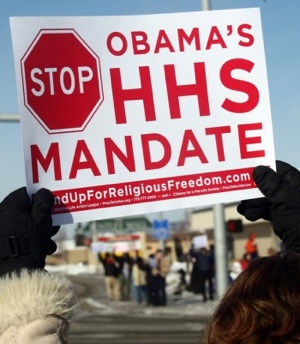
The Catholic leaders called special attention to King’s 1963 Letter from a Birmingham Jail, in which he quoted St. Augustine—“An unjust law is no law at all.” They elaborated: “When fundamental human goods, such as the right of conscience, are at stake, we may need to witness to the truth by resisting the law and incurring its penalties.”
Their April 12 statement, “Our First, Most Cherished Liberty,” started the bishops on this path toward calling for unspecified civil disobedience if that’s what it takes. At the time, the prelates announced their Fortnight for Freedom, hastening to add that it would coincide with the feast days of several Christian martyrs.
This 12-page exhortation was not penned in a squalid prison cell. It was probably drafted in the splendid headquarters of the U.S. Conference of Catholic Bishops in northeast Washington, D.C., or in a cardinal’s mansion. That aside, the bishops appear to be making an astonishing claim. They’re suggesting a sort of moral equivalence between their grievances under Obama and those of the Negro under segregation.
In the bulletin insert, the hierarchs did not even get around to talking about their campaign until halfway through the message, after mingling their gripes with the “dark history” of racial oppression.
The litany of complaints begins with the Obama administration’s ruling in January that employees of Catholic hospitals and universities must have access to contraception coverage through their healthcare plans. And it extends to other disputes including whether local Catholic Charities should receive government money for adoption services if they refuse to place children with gay couples. (This past spring I covered a refreshingly civil debate on these matters for Boston College Magazine, and the article is available here.)
Consider a few juxtapositions between the April 12 letter from a distressed hierarchy and the epistle from a Birmingham jail.
Lynching and Licenses
The bishops: “Boston, San Francisco, the District of Columbia and the state of Illinois have driven local Catholic Charities out of the business of providing adoption or foster care services—by revoking their licenses, by ending their government contracts, or both—because those Charities refused to place children with same-sex couples or unmarried opposite-sex couples who cohabit.”
King: “I guess it is easy for those who have never felt the stinging darts of segregation to say, ‘Wait.’ But when you have seen vicious mobs lynch your mothers and fathers at will and drown your sisters and brothers at whim; when you have seen hate-filled policemen curse, kick, brutalize and even kill your black brothers and sisters with impunity …”
The bishops: “New York City enacted a rule that barred the Bronx Household of Faith and sixty other churches from renting public schools on weekends for worship services even though non-religious groups could rent the same schools for scores of other uses. While this would not frequently affect Catholic parishes, which generally own their own buildings, it would be devastating to many smaller congregations. It is a simple case of discrimination against religious believers.”
King: “ … when you are humiliated day in and day out by nagging signs reading ‘white’ and ‘colored’; when your first name becomes ‘nigger’ and your middle name becomes ‘boy’ (however old you are) … when your wife and mother are never given the respect title ‘Mrs.’; when you are harried by day and haunted by night by the fact that you are a Negro, living constantly at tiptoe stance never quite knowing what to expect next, and plagued with inner fears and outer resentments … then you will understand why we find it difficult to wait.”
Just and Unjust Laws
The bishops: “An unjust law cannot be obeyed. In the face of an unjust law, an accommodation is not to be sought … Catholics in America must have the courage not to obey [unjust laws].” And, the bishops, quoting directly from King’s letter: “How does one determine when a law is just or unjust? A just law is a man-made code that squares with the moral law or the law of God. An unjust law is a code that is out of harmony with the moral law.”
King: “Let us turn to a more concrete example of just and unjust laws. An unjust law is a code that a majority inflicts on a minority that is not binding on itself. This is difference made legal. On the other hand a just law is a code that a majority compels a minority to follow that it is willing to follow itself. This is sameness made legal.” (Note: By this standard, the contraception mandate is not unjust because it applies equally to everyone.)
There are fair contentions on both sides of the debate over whether government is going too far in one or more of the cases exhibited by the Catholic hierarchy. The matter of the bishops and Obama is not a simple one. But the question of their campaign and the historic struggle for civil rights is plain enough: there’s no comparison. The issue of segregation was black and white morally as well as racially, a simple matter of decency and justice. The fight that the bishops have engaged has little of that clarity.
The bishops would do us all a favor by positioning themselves as religious leaders who object to what they see as a debatable public policy, rather than as martyrs in the making with God and the GOP on their side. …read more





